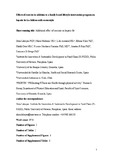Mostrar el registro sencillo del ítem
Effects of exercise in addition to a family-based lifestyle intervention program on hepatic fat in children with overweight
| dc.creator | Labayen Goñi, Idoia | es_ES |
| dc.creator | Medrano Echeverría, María | es_ES |
| dc.creator | Arenaza, Lide | es_ES |
| dc.creator | Maiz, Edurne | es_ES |
| dc.creator | Osés Recalde, Maddi | es_ES |
| dc.creator | Martínez Vizcaíno, Vicente | es_ES |
| dc.creator | Ruiz, Jonatan R. | es_ES |
| dc.creator | Ortega, Francisco B. | es_ES |
| dc.date.accessioned | 2020-05-29T07:13:45Z | |
| dc.date.available | 2020-05-29T07:13:45Z | |
| dc.date.issued | 2020 | |
| dc.identifier.issn | 0149-5992 | |
| dc.identifier.uri | https://hdl.handle.net/2454/37005 | |
| dc.description.abstract | OBJECTIVE Pediatric hepatic steatosis is highly prevalent and closely related to type 2 diabetes. This study aimed to determine whether the addition of supervised exercise to a family-based lifestyle and psycho-educational intervention results in greater reduction of percentage of hepatic fat (HF), adiposity, and cardiometabolic risk factors in children with overweight/obesity. RESEARCH DESIGN AND METHODS The study subjects of this nonrandomized, two-arm, parallel design clinical trial were 116 overweight/obese children (10.6 +/- 1.1 years of age, 53.4% girls) living in Vitoria-Gasteiz (Spain). For 22 weeks, they followed either a lifestyle and psycho-education program (control intervention [CInt], N = 57), consisting of two family-based education sessions/month, or the same plus supervised exercise (intensive intervention [II], N = 59) focused mainly on high-intensity aerobic workouts (3 sessions/week, 90 min/session). The primary outcome was the change in percentage of HF (as measured by MRI) between baseline and the end of the intervention period. Secondary outcomes included changes in BMI, fat mass index (FMI), abdominal fat (measured by DEXA), blood pressure, triglycerides, HDL, LDL, gamma-glutamyl transferase, glucose, and insulin concentrations. RESULTS A total of 102 children completed the trial (N = 53 and N = 49 in the CInt and II groups, respectively). Percentage of HF decreased only in the II group (-1.20 +/- 0.31% vs. 0.04 +/- 0.30%, II and CInt groups, respectively), regardless of baseline value and any change in adiposity (P < 0.01). BMI, FMI, abdominal fat (P <= 0.001), and insulin (P < 0.05) were reduced in both groups. CONCLUSIONS Multicomponent intervention programs that include exercise training may help to reduce adiposity, insulin resistance, and hepatic steatosis in overweight/obese children. | en |
| dc.description.sponsorship | This project was funded by the Spanish Ministry of Health 'Fondos de Investigation Sanitaria del Institute de Salud Carlos III' (PI13/01335), the Spanish Ministry of Industry and Competitiveness (DEP2016-78377-R), and by EU Fondos Estructurales de la Unión Europea (FEDER) funds ('Una manera de hacer Europa'). Support was also provided by grants from the Spanish Ministry of Education, Culture and Sports (FPU14/03329), the Education Department of the Government of the Basque Country (PRE_2016_1_0057, PRE_2017_2_0224, PRE_2018_2_0057), the University of Granada Plan Propio de Investigacion 2016-Excellence actions: Unit of Excellence on Exercise and Health (UCEES), and Junta de Andalucía, Consejería de Conocimiento, Investigación y Universidades (FEDER, ref. SOMM17/6107/UGR). | en |
| dc.format.extent | 32 p. | |
| dc.format.mimetype | application/pdf | en |
| dc.format.mimetype | application/zip | en |
| dc.language.iso | eng | en |
| dc.publisher | American Diabetes Association | en |
| dc.relation.ispartof | Diabetes Care, 2020, 43 (2), 306-313 | en |
| dc.subject | Hepatic steatosis | en |
| dc.subject | Childhood | en |
| dc.subject | Physical activity | en |
| dc.subject | Nutrition | en |
| dc.subject | Psychology | en |
| dc.subject | Obesity | en |
| dc.title | Effects of exercise in addition to a family-based lifestyle intervention program on hepatic fat in children with overweight | en |
| dc.type | info:eu-repo/semantics/article | en |
| dc.type | Artículo / Artikulua | es |
| dc.contributor.department | Institute on Innovation and Sustainable Development in Food Chain - ISFOOD | es_ES |
| dc.rights.accessRights | info:eu-repo/semantics/openAccess | en |
| dc.rights.accessRights | Acceso abierto / Sarbide irekia | es |
| dc.identifier.doi | 10.2337/dc19-0351 | |
| dc.relation.projectID | info:eu-repo/grantAgreement/ES/1PE/DEP2016-78377-R | en |
| dc.relation.publisherversion | https://doi.org/10.2337/dc19-0351 | |
| dc.type.version | info:eu-repo/semantics/acceptedVersion | en |
| dc.type.version | Versión aceptada / Onetsi den bertsioa | es |


